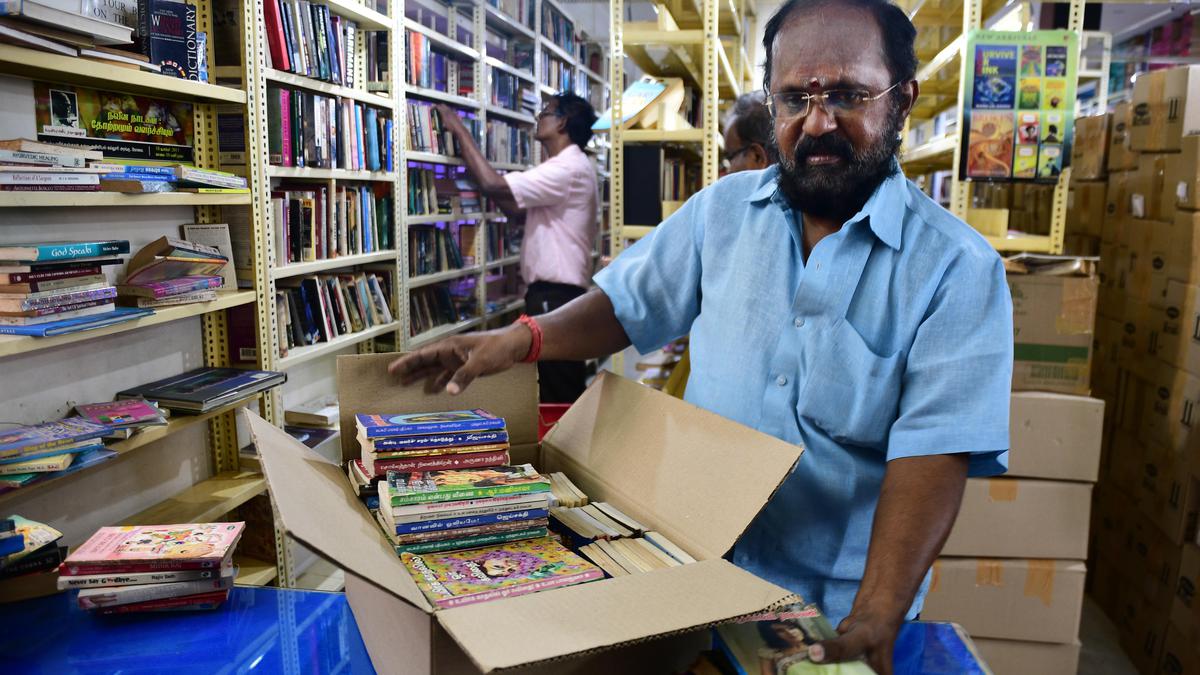
Remembering Coimbatore’s Thiagu Book Centre’s good old days
The Hindu
Coimbatore’s Thiagu Book Center shuts down
The shelves are nearly empty. P Thiagarajan is at the far end of the library, trying to keep himself distracted amid a fast-depleting pile of books. Clearly, it is not working. He gets emotional with every passing title, and understandably so. The 1000 sq ft space filled with books sums up his life’s purpose. “ Most of the Tamil titles are gone,” says the 63-year-old. As Thiagu Book Centre, one of the oldest libraries in the city, downs its shutters due to low patronage, its founder Thiagarajan is giving away his books for massive discounts.
“A lot has changed over the years,” says Thiagarajan, recalling a time children would queue up in front of his library when he closed it for a lunch break. “They would ask me, ‘Why can’t you come sooner, uncle?’,” he laughs, adding how he eventually ended up cutting his lunch breaks short. Thiagu Book Centre was started in 1980 in a rented space near the Head Post Office.
Thiagarajan’s father Perumal Samy set it up for him, soon after the former finished college. “Father ran a petty shop selling newspapers, magazines, and candy on Stanes Mill Road in the 1960s,” recalls Thiagarajan, adding, “He later set up Excellent Book Centre, a library on VH Road and I gave him a hand on and off.” This laid the foundation for his understanding of a library’s functioning.
Thiagu Book Centre was first spread across a small room with around 20,000 titles. “We charged 25 paise to borrow a book,” says Thiagarajan. In their initial days, he agrees to being a stern librarian who hardly spoke. “This is because every librarian I encountered in school and college were that way,” he chuckles. “Imagine being entrusted with hundreds of titles and having to keep it safe from eager children.”
He eventually loosened up, gradually earning friends for a lifetime. “I had my own way of arranging titles; I did not study Library Science,” he points out, adding how he would gauge a reader’s interest by simply looking at the first book he/she pulled out from the shelves. “I would then strike a conversation and show them similar works that may interest them.”
The library moved to its present location in RS Puram in 2010. Thiagarajan is a voracious reader himself, and counts Ashokamitran among his favourite authors. Driven by his love for reading, he sourced several rare titles, knowing that someone would come looking for them. They always did. Thiagu was the first place any reader worth her salt stopped by to locate that elusive title not available elsewhere in the city.
Gradually, writers got word of the library. “Several writers such as Nanjil Nadan, S Ramakrishnan, and Rajesh Kumar have dropped by,” explains Thiagarajan.

“Writing, in general, is a very solitary process,” says Yauvanika Chopra, Associate Director at The New India Foundation (NIF), which, earlier this year, announced the 12th edition of its NIF Book Fellowships for research and scholarship about Indian history after Independence. While authors, in general, are built for it, it can still get very lonely, says Chopra, pointing out that the fellowship’s community support is as valuable as the monetary benefits it offers. “There is a solid community of NIF fellows, trustees, language experts, jury members, all of whom are incredibly competent,” she says. “They really help make authors feel supported from manuscript to publication, so you never feel like you’re struggling through isolation.”

Several principals of government and private schools in Delhi on Tuesday said the Directorate of Education (DoE) circular from a day earlier, directing schools to conduct classes in ‘hybrid’ mode, had caused confusion regarding day-to-day operations as they did not know how many students would return to school from Wednesday and how would teachers instruct in two modes — online and in person — at once. The DoE circular on Monday had also stated that the option to “exercise online mode of education, wherever available, shall vest with the students and their guardians”. Several schoolteachers also expressed confusion regarding the DoE order. A government schoolteacher said he was unsure of how to cope with the resumption of physical classes, given that the order directing government offices to ensure that 50% of the employees work from home is still in place. On Monday, the Commission for Air Quality Management in the National Capital Region and Adjoining Areas (CAQM) had, on the orders of the Supreme Court, directed schools in Delhi-NCR to shift classes to the hybrid mode, following which the DoE had issued the circular. The court had urged the Centre’s pollution watchdog to consider restarting physical classes due to many students missing out on the mid-day meals and lacking the necessary means to attend classes online. The CAQM had, on November 20, asked schools in Delhi-NCR to shift to the online mode of teaching.









